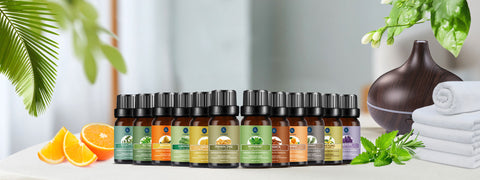No Products in the Cart
-
5% OFF
ON ORDERS US$80+
Code:T9PXP5
-
8% OFF
ON ORDERS US$100+
Code:6GDN5F
-
10% OFF
ON ORDERS US$150+
Code:JGW6JZ

Essential oils are often used in aromatherapy, a form of alternative medicine that employs plant extracts to support health and well-being. However, some of the health claims associated with these oils are controversial. This article explains all you need to know about essential oils and their health effects.
Essential oils are highly concentrated, aromatic compounds extracted from various plant parts such as seeds, fruit peels, barks, flowers, leaves, berries, resins, stems and roots.
They’re mainly produced by methods of solvent extraction, distillation, or expression. Essential oils give plants their unmistakable aromas and it is in these essences that we find the powerful – even seemingly magical -- healing properties.
Essential oils have long been used in personal care, skin care, aromatherapy, and other psychological, emotional, as well as spiritual applications.
Some of the health benefits of aromatherapy include its ability to:
Help promote or improve Help alleviate or reduce
Relaxation Worry
Sleep quality Anxiety
Congested breathing Fatigue
Skin conditions Nausea
Alertness Muscle soreness
Cognitive performance
Spiritual healing process
Energy levels
Mood balance

There are more than 90 types of essential oils, each with its own unique smell and potential health benefits.
Here’s a list of 19 popular essential oils and the health claims associated with them:
Peppermint: helps with concentration, motivation; relieves sore muscles
Orange: helps boost optimism, confidence; relieves stress, anger
Sandalwood: helps with focus, calm nerves
Lavender:helps relieve stress and skin issues
Bergamot: helps reduce stress and improve skin conditions like eczema
Rose: helps promote romance and peace; relieves depression, fear.
Chamomile: helps relieve pain, reduce inflammation and accelerate healing times
Ylang-Ylang: helps promote positivity and romance; relieves anxiety
Tea Tree: relieves rashes, acne, insect bites
Jasmine: helps promote confidence and passion; relieves depression
Lemon: helps boost energy, clarity; relieves depression
Lemongrass: helps concentration and clarity; relieves pessimism.
Geranium: helps promote calmness and relaxation
Eucalyptus: helps promote courage, confidence
Frankincense: helps relieve nervous tension, anxiety.
Rosemary: helps promote concentration and nervous debility.
Vetiver: helps to relax and beneficial for stress, anxiety.
Cedarwood: helps to calm the mind and promote emotional security
Grapefruit: helps with cellulite, obesity and water retention.
Essential oils are generally considered safe to inhale or apply to the skin if they’ve been combined with a base oil. They should not be eaten.
For minor health problems, using essential oils as a complementary therapy is likely harmless.
However, if you have a serious health condition or are taking medication, you should discuss their use with your healthcare practitioner.
You may also be interested in:
How to use tea tree oil at home
How to use lavender essential oil
lxOgNajzqQ
RDoizGphdAcy
oXSJpsxNg
Aromatherapy is knew to me, but I’m finding it very interesting. The essential oils that I like are lavender (particularly French lavender), mulberry, bergamot, eucalyptus, geranium, jasmine, orange, rose, sandalwood, tangerine, vanilla, and ylang ylang. Regarding carrier oils, I am fond of rose hip and sweet almond. I’m interested in discovering more. Is there a way to customize the essential oils and carrier oils, I like, into a boxed set? Also, I’m interested in a new diffuser. Several years ago, one of my GA’s gave me a diffuser and a gift set of 6 essential oils, once he’d completed his dissertation defense and took a teaching position at another university. In the meantime, my wife has been taking care of this. However, the time is common for more essential oils, and perhaps some carrier oils, along with a new diffuser.